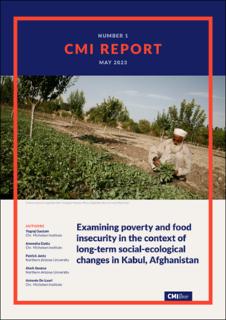Examining poverty and food insecurity in the context of long-term social-ecological changes in Kabul, Afghanistan
Research report
Permanent lenke
https://hdl.handle.net/11250/3069047Utgivelsesdato
2023-05-01Metadata
Vis full innførselSamlinger
- Publications [1488]
Originalversjon
Bergen: Chr. Michelsen Institute (CMI Report 2023:1) 20 p.Sammendrag
This report examines how long-term socioeconomic and environmental changes have shaped the context for poverty and food insecurity in Afghanistan. An estimated 97% of the population is currently under the poverty line and over half the population of 36 million people need immediate humanitarian support. , Following the Taliban takeover of the country in August 2021, Afghanistan has faced an international freeze on development and governance assistance, a freezing of the Afghan State Bank’s assets in the United States and Europe, a severe weakening of both private and public sector and a mass-scale unemployment. This, coupled with the rise in commodity prices has increased poverty and hunger prevalence to emergency levels. Moreover, new regulations imposed by the Taliban leadership on female education, employment and mobility has increased challenges for women to accessing jobs in both private and public sector. The situation looks likely to worsen in both the short and longer terms.
Utgiver
Chr. Michelsen InstituteSerie
CMI Report 2023:1CMI Report 2023:1
